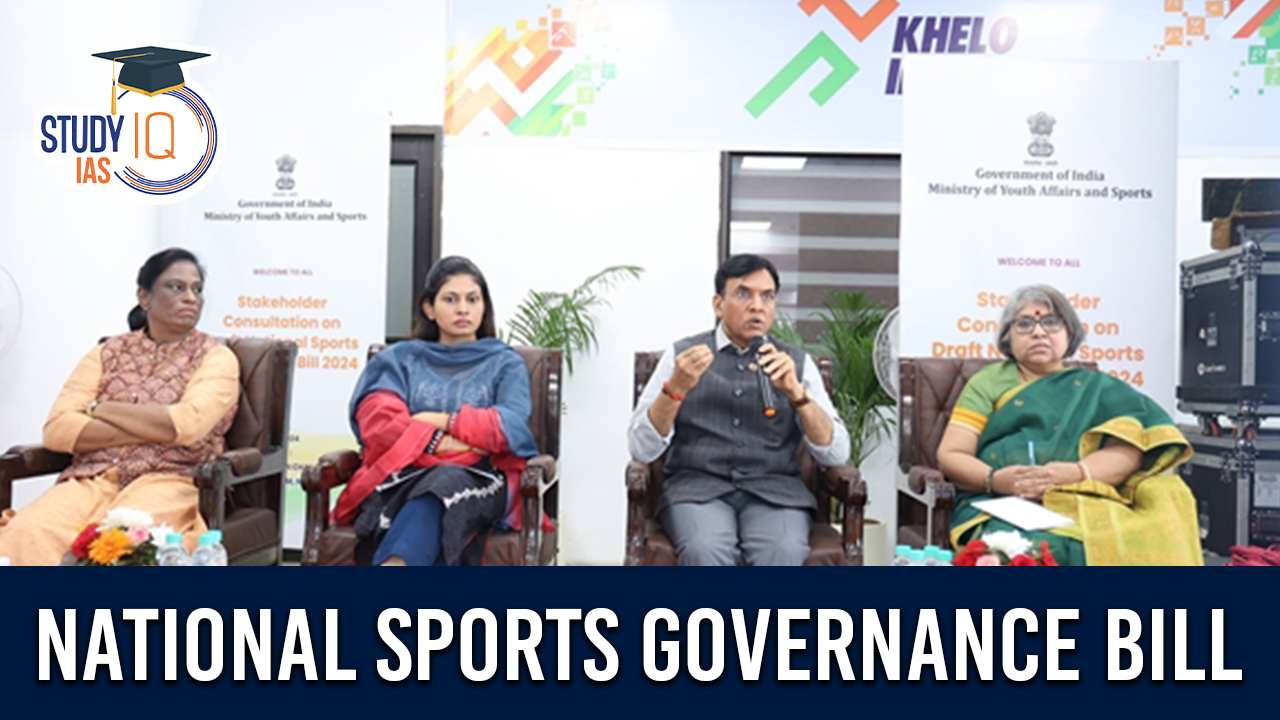About Draft National Sports Governance Bill 2024
- Objectives:
- Development and promotion of sports and welfare measures for sportspersons.
- Establishment of ethical and good governance practices in sports federations.
- Creation of an equitable system for resolving sports disputes.
What are the Key Features?
- Sports Regulatory Board of India: A central authority for regulating and recognising National Sports Federations (NSFs).
- Ensures compliance with governance, financial, and ethical standards.
- Flexibility in recognising NSFs without fixed formulas.
- Governance Structure: Alignment of Indian Olympic Association (IOA), Paralympic Committee of India (PCI), and NSF with international policies while protecting national interests.
- Restricts Executive Committee (EC) size to 15 members.
- Encourages NSFs to have full-time professional management headed by a CEO.
- NSFs must ensure good governance in all constituent units.
- Ethical and Governance Standards: Mandatory establishment of Ethics Commissions and Dispute Resolution Commissions at all levels (NOC, NPC, and NSF).
- Emphasises transparency, fairness, and integrity in decision-making.
- Athletes Commissions: Mandates Athletes Commissions in the NOC, NPC, and NSFs to give athletes a platform for participation in decision-making and policy formulation.
- Provision for additional government funding to these commissions.
- Athlete Representation: Ensures 10% of voting members in the General Body of the NOC, NPC, and NSFs are sportspersons of outstanding merit (SOMs).
- At least two SOMs (one male and one female) must serve on the Executive Committee.
- Safe Sport Policy: Introduces a policy focusing on protecting athletes, especially minors and women, from harassment and abuse.
- Adheres to the POSH Act, 2013.
- National Sports Promotion Organisations (NSPOs): Establishes guidelines for recognising NSPOs that work towards sports governance and athlete development.
- Provides a framework for NGOs and private organisations to contribute.
- Appellate Sports Tribunal: A dedicated tribunal for sports-related disputes, reducing reliance on civil courts and ensuring faster dispute resolution.
- Ad-hoc Normalisation Committees: Allows the Sports Regulatory Board to form ad-hoc normalisation committees in case of non-compliance or suspension of federations.
- Anti-Doping and Ethical Standards: Strong focus on anti-doping measures and adherence to international anti-doping rules.
- Federations must formulate Codes of Ethics aligned with the IOC Code of Ethics.
- Public Accountability and Transparency: Ensures transparency by subjecting NOC, NPC, and NSFs to the RTI Act, with certain exclusions like performance and medical data.
- Gender Representation: Mandates 30% gender representation in Executive Committees, promoting gender equality and inclusivity in sports governance.
- Sports Election Panel: Establishes a panel for overseeing free and fair elections within sports bodies, comprising experienced electoral officers.
- Use of National Name and Insignia: Only recognized bodies can use national symbols– Indian Flag and national names.
- Penalties for violations (up to one year imprisonment or ₹10 lakhs fine).


 SEBI’s SWAGAT-FI Framework for Low-Ris...
SEBI’s SWAGAT-FI Framework for Low-Ris...
 How the US and China Are Sabotaging the ...
How the US and China Are Sabotaging the ...
 Village Defence Guards (VDGs): Role, Str...
Village Defence Guards (VDGs): Role, Str...

























